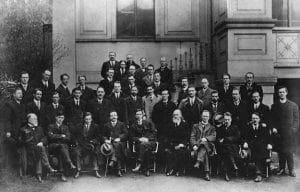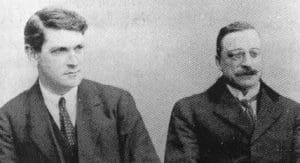March is Irish-American Heritage Month. This is an ideal time to take a look at a pivotal event in Irish history whose 100th anniversary is this year: the Irish War of Independence, 1919-1921.
The first shots were fired on January 21, 1919, when a group of Irish Republic Army (IRA) volunteers ambushed and killed two members of the Royal Irish Constabulary (RIC) at Soloheadbeg, County Tipperary. That same day, members of the nationalist Sinn Féin party, fresh from their victory in the December 1918 general election, set up an independent parliament (Dáil Éireann) in Dublin and proclaimed an Irish Republic.
The war was fought with both the ballot box and the bullet. Eamon De Valera, as President of Dáil Éireann, headed to the United States to drum up support, and raise funds, for the rebel government. Michael Collins, the IRA’s charismatic director of intelligence, took command in the field. Collins believed that a sustained campaign of guerrilla warfare would weaken the British will to rule, and bring them to the negotiating table.
The IRA, poorly armed and lacking in money and training, brought the fight to the British by targeting the RIC, and British Army barracks. The British responded by recruiting two new forces – the Black and Tans, and the Auxiliaries- mostly made up of ex-soldiers, to support the RIC. The IRA fought an effective guerrilla war against the occupying forces for over two years.
A ceasefire was declared in July 1921. Michael Collins and Arthur Griffith led the Irish Delegation to London to negotiate an end to the war. The controversial Anglo-Irish Treaty was signed on December 6, 1921, and was later ratified by the Dáil. Ireland had won self-governing dominion status within the British Commonwealth, but not the desired republic. In addition, six northern counties were to remain within the United Kingdom. The treaty split the pro-republic movement and led to a brief, but bitter, civil war.
In the Dáil debates on the treaty, Collins said it provided Ireland not with “the ultimate freedom that all nations desire, but the freedom to achieve it.” His words proved prophetic. The Republic of Ireland Act 1948, which took effect on 18 April 1949, ended the connection to the British Commonwealth and Ireland became a republic.
To learn more about the Irish War of Independence, check out the resources listed below.
This year is the centenary of the start of the Irish War of Independence, a guerrila war fought against the forces of British rule in Ireland from 1919-1921. The war ended on December 6, 1921 with the signing of the Anglo-Irish Treaty which granted a measure of self-rule to 26 of Ireland's 32 counties. To learn more about the conflict, check out this list of resources.




Add a comment to: The Irish War of Independence Centenary